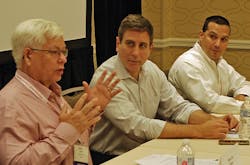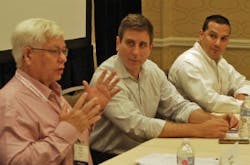New tech, new thinking streamlines capital projects
To handle today's ramped-up project management challenges, Valero’s Steve Cox (left), Honeywell’s Jason Urso (center) and Bechtel’s Robert Resendez (right), outlined the enhanced strategies, methods and tools their organizations are bringing to bear. Mark Sen Gupta of ARC Advisory Group moderated the media panel discussion.
Project execution in the process industries has never been a day at the beach, but multiplying time and cost pressures, increasing project complexity and accelerating technical upheaval are combining to make it more difficult than ever before. To help illustrate how new technologies and new project methodologies are helping to make these issues more manageable, Honeywell Process Solutions convened an expert panel representing a range of industry perspectives at Honeywell Users Group Americas 2019 this week in Dallas.
Representing the owner/operator perspective was Steve Cox, control system engineering manager at Valero’s McKee refinery. Robert Resendez, control and automation manager for Bechtel, spoke for the engineering, procurement and construction (EPC) community. Jason Urso, CTO for Honeywell Process Solutions, rounded out the panel with the automation technology supplier point of view.
Moderating the discussion was Mark Sen Gupta, research director at ARC Advisory Group. He kicked off the panel discussion for members of the media with a rather gloomy assessment of industry’s overall track record on capital projects. "Research indicates that 64% of projects meet their goals and only 39% meet their outlined schedules, budgets and specs,” Sen Gupta said. “Meanwhile another 59% have cost and/or schedule overruns, and 70% of companies report at least one ‘failed’ project per year.”
And while new technologies and new methodologies are helping, it’s clear that challenges remain significant, and within many organizations old habits die hard.
Strong headwinds
"The big challenge is how to utilize new technologies and still meet customer requirements," said Bechtel’s Resendez. "This is because many users want to use new technologies like programmable I/O, but they don't know how to fit them into their applications."
Valero's Cox added that, "In the last five years, the biggest change we've had to deal with is the speed of change itself. Everything's happening faster than in the past, especially in the process automation field. Some projects seem to be over as soon as they get started.
"Plus, the amount of change in automation related to refining is much more than in other aspects of refining. And, because people in those areas aren't as up to speed on automation, we have to bring them along—even though there’s resistance. As an organization, we're also seeing problems we never saw before, and must constantly adapt to things we didn't see coming."
Cox added another major project management challenge is coping with limited resources and complying with plant management's requirements that automation projects avoid causing process disruptions or unplanned outages. "Valero's bottom line is safety, environmental responsibility and reliability," said Cox. "But we're also a very remote refinery, so we don't have a lot of automation professionals and contractors just down the road, which makes it even more important for us to address issues in a cost-effective way. We execute to get projects done, but before the automation people leave, we have to get our staff up to speed on any new system."
Missions shift
Honeywell’s Jason Urso, suitably seated between the end user and EPC representatives on the panel, reported that his organization’s role in the project management space has traditionally been to assist its customers in keeping their processes and plants running reliably and safely, and helping them to migrate equipment and facilities when needed. "Part of this effort is using technology to keep automation projects off the critical path because last-minute changes to I/O, controls and other devices are challenging to execute, so we're always asking how we can help.
"Many project management practices are decades old, but some of the newer technologies can make them more efficient,” Urso added. “For instance, capital projects are usually based on cost, scheduling and risk, but now they can be redesigned to use newer solutions to get started sooner and operate more efficiently once they come online."
Flexible and standardized
Resendez added that one way EPCs like Bechtel design and develop their projects in the face of today's constant change is by building in greater flexibility through the use of standardized solutions where possible. "For us, flexibility means focusing on standard products and standard templates," he explained. "We also use good management of change (MOC) practices from design to implementation, even though the level of integration typical of today’s projects presents an added challenge."
Project participants need to expect some degree of change simply because no project can be flawlessly designed up front, Urso added. "Users need the ability make changes without too many change orders, which is why Honeywell focuses on simplification, so they can add or modify control solutions seamlessly. We also can't assume all the cabinet-level details will be settled up front, so cabinet designs also need to be adaptable.
"Even though there are many projects of the same type, each also has unique aspects. That being said, even though much technology has the potential to be standardized and reused, many I/O and controls are still designed in from the ground up. Everyone recognizes that we need to get away from these mass customization of the past.
“The next step-change in industry is recognizing commonalities, recognizing we don't always need to redesign control strategies and HMIs from the ground up, and reusing more technology when we can."
To cope with today's increasing lack of skills and people, Urso added that new technology can help fill in. "Software such as our Experion PKS Highly Integrated Virtual Environment (HIVE) can be used to assign roles and drive standardization around controls," he said. "This decoupling of software from hardware is important because, for example, when you order a Spider-Man movie from Neflix, you shouldn't have to worry about what server it's on. We know we've only scratched the surface so far, and that we have more to learn from the IT industry."
To put some newer project management principles into practice, Resendez reported that Bechtel recently completed six liquid natural gas (LNG) projects that required many I/O changes. "The flexibility of Honeywell Universal I/O changed our whole work process," said Resendez. "We like to standardize on stuff outside the usual control system world and use third-party packages when we can, but we also want to take this standardization to the next step. This can be tough to do with some items like process safety graphics,” Resendez said. “Still, standardized DCS packages will likely become more acceptable in even the next six months."
Convince colleagues, balance costs
Despite the benefits that new project management tools can bring, Valero’s Cox added that many stakeholders still have to be convinced. "Many refining people don't want to have anything to do with us or others they think of as computer geeks—even though they rely on our controls. We have to find ways to bring them along," he said.
"Valero's project group puts in the [distillation] towers and other facilities, and we sometimes have to work with what we’re given to seamlessly add automation. For example, we've been doing a major DCS migration over the past three years, but again, plant management says we can't cause any process disruptions, even if an automation project takes longer or costs more."
Resendez added that cost remains a primary project driver, but it continues to be balanced by scheduling. "Users ask how what we're delivering will help their performance and meet their objectives, so we have to show how it can," he added. "There also used to be a lot of finger-pointing on projects, so we developed our Integrated Team approach that involves engineers, automation personnel, contractors and suppliers from design through startup, and has them collaborate throughout the project lifecycle."
To avoid miscommunications between sales and development staffs, Cox added that Valero brings these different teams together, and gets project teams updated on the technologies they'll need to implement. "Project changes can come in on a daily basis, so communications, common objectives and standard procedures are more important than ever," he said. "This is where technologies like Universal I/O can positively impact project costs, system footprint, labor costs and other issues we have to deal with."
About the Author

Leaders relevant to this article:


